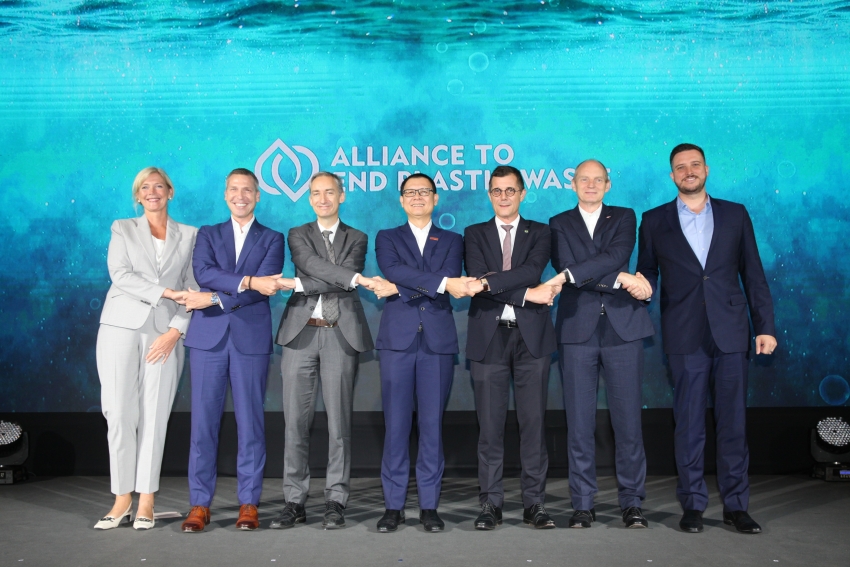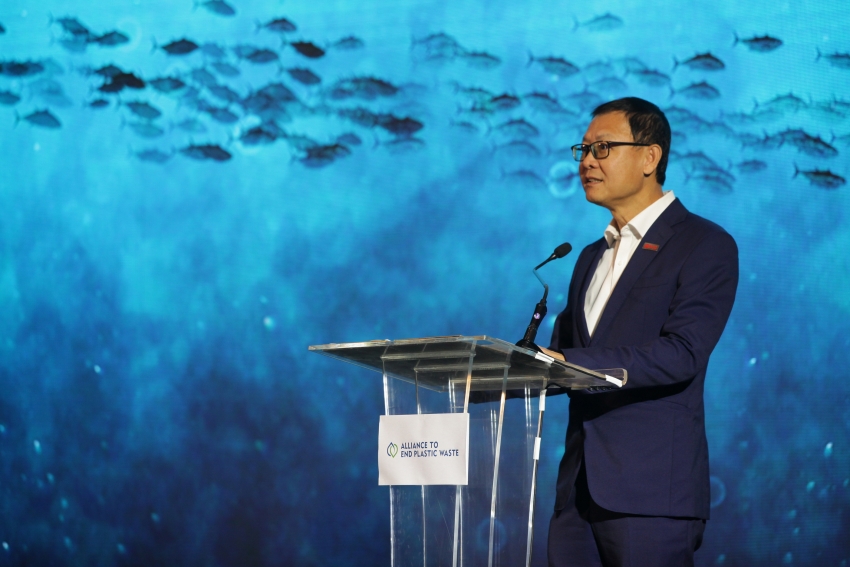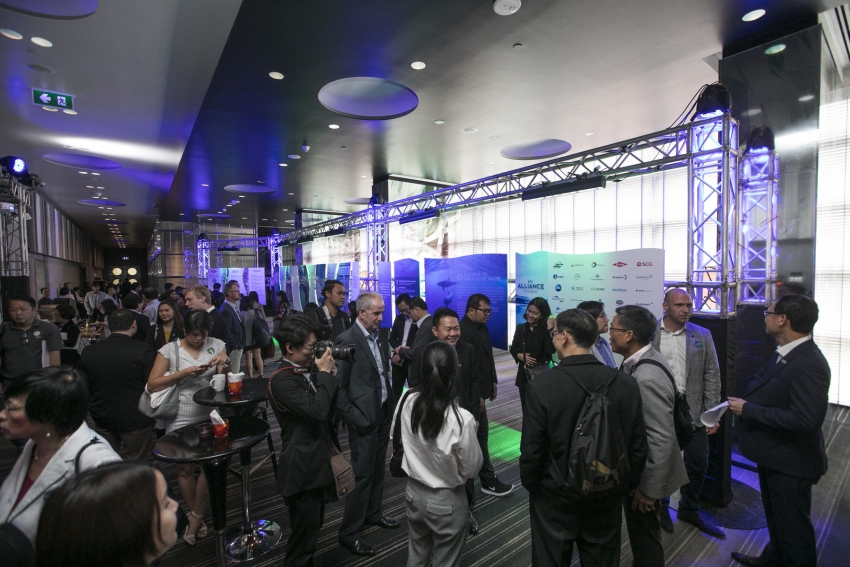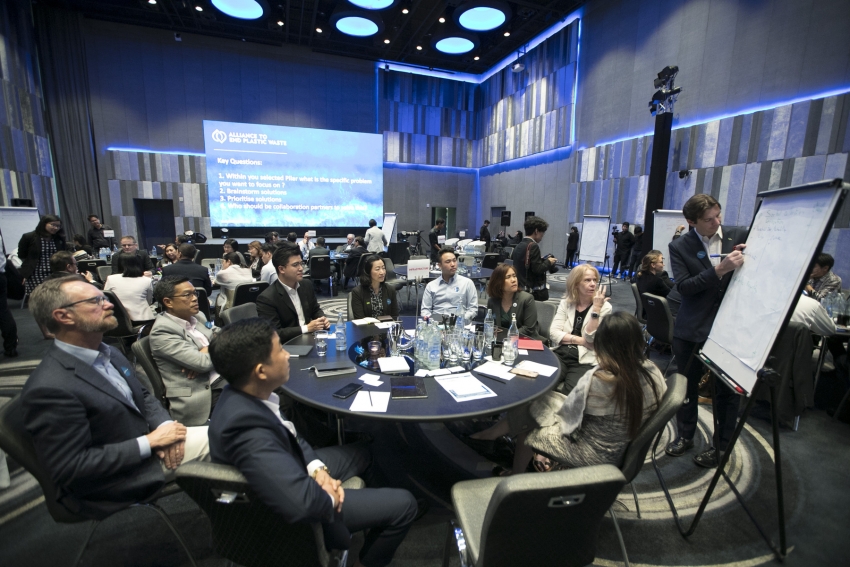BANGKOK – August 27, 2019 Global companies from across the value chain, including chemical and plastic manufacturers, today held the first Alliance to End Plastic Waste (AEPW) forum in Southeast Asia. The forum introduced the Alliance, a global non-profit organization aiming to end plastic waste in the environment, especially in the ocean, to Southeast Asia and Thailand.
Jim Seward, Vice President, Sustainability, Technology and Joint Ventures, LyondellBasell, a representative of AEPW said, “The issue of plastic waste is seen and felt all over the world. I urge all companies, big and small and from all regions and sectors, to join us. We believe the time for action is now. Success will require collaboration and a coordinated effort across many sectors to create sustainable outcomes and impacts.”
The Alliance represents 40 companies that are headquartered in North and South America, Europe, Africa, the Middle East, and Asia. Many of these companies have significant operations in Southeast Asia, including Thailand. The Alliance has committed almost $1.0 billion in funds, with the goal of investing $1.5 billion over the next five years to develop solutions that will minimize and manage plastic waste and promote post-use solutions. Alliance efforts will focus many of its efforts in Southeast Asia, where the need is greatest.
Brendan Edgerton, Director of Circular Economy from World Business Council for Sustainable Development said, “Despite the many benefits plastics bring to people around the world, including improvements in living standards, health and safety, and sustainability, unmanaged plastic waste has become a global challenge. We are working to make the dream of a world without plastic waste a reality.”
The Alliance is a not-for-profit organization that includes companies that make, use, sell, process, collect, and recycle plastics. This includes chemical and plastic manufacturers, consumer goods companies, retailers, converters, and waste management companies, also known as the plastics value chain. The Alliance has been working with the World Business Council for Sustainable Development as a founding strategic partner.
The Alliance strategy is based on making progress in four key areas: infrastructure, innovation, education and engagement, and clean up.
The Alliance today also highlighted an initial set of collaborative projects that reflect a range of solutions to help end plastic waste, such as: partnering with cities to design integrated management systems in large urban areas where infrastructure is lacking; promoting technologies, business models and entrepreneurs to prevent ocean plastic waste; developing an open-source data platform to provide valuable information about the sources, location and formats of plastic waste to help support waste management projects; building collaboration with intergovernmental organizations to identify the most effective solutions; and supporting investment and engagement to capture plastic waste before it reaches the ocean.
“Sixty percent of plastic waste in the ocean can be sourced to five countries in Southeast Asia and we agree that this is a serious global challenge that calls for swift action and strong leadership,” said Cholanat Yanaranop, Executive Vice President, SCG and President, Chemicals Business, SCG “We have many successful cases and piloting initiatives, as well as, waste management projects and solutions based on the circular economy approach with the local collaborative projects, such as Smart Litter Trap 4.0,” he added.
Antoine Grange, CEO, Recycling and Recovery of SUEZ Asia, “While our effort will be global, the Alliance can have the greatest impact by focusing on parts of the world where the challenge is greatest such as Southeast Asia region where more than half of the world’s plastic waste have been found, and by sharing solutions and best practices so that these efforts can be amplified and scaled-up around the world.”
Thailand has been fully aware of this global challenge and is taking a proactive approach, such as the government’s Roadmap on Plastic Waste Management for 2018 – 2030. By the end of 2022 Thailand hopes to be free of plastic bags less than 36 microns thick, Styrofoam food boxes, plastic straws, and single-use plastic cups. The goal is to reduce Thailand’s plastic ocean waste at least 50% by 2027.
Thailand Public Private Partnership for Plastic and Waste Management (Thailand PPP Plastic) is an unprecedented collaboration between 15 organizations from the government sector, private sector, and non-profit organizations that on June 5, 2018 signed an MOU to address Thailand plastic marine debris.
“In 2010 Thailand ranked sixth for global marine plastic debris. With the collaboration of all parties, we can draw up a blueprint to address Thailand’s waste problems in a sustainable manner. And where possible, proliferate this blueprint to other parts of Southeast Asia” said Jonathan Penrice, Asia Pacific President of Dow.
The following companies are founding members of the Alliance: BASF, Berry Global, Braskem, Chevron Phillips Chemical Company LLC, Clariant, Covestro, Dow, DSM, ExxonMobil, Formosa Plastics Corporation USA, Henkel, LyondellBasell, Mitsubishi Chemical Holdings, Mitsui Chemicals, NOVA Chemicals, OxyChem, PolyOne, Procter & Gamble, Reliance Industries, SABIC, Sasol, SUEZ, Shell, SCG Chemicals Public Company Limited, Sumitomo Chemical, Total, Veolia, Versalis (Eni), EQUATE Petrochemical Company, Gemini Corporation, Grupo Phoenix, Mondi, Novolex, PepsiCo, Sealed Air Corporation, Sinopec, SKC co., ltd., Storopack, TOMRA, and Westlake Chemical Corporation. For more information, please visit www.endplasticwaste.org








